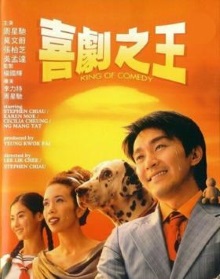
Over the course of the past few months, we’ve been slowly working our way through a good number of old Stephen Chow films. The main reason is that my wife feels like writing something that draws inspiration from his films and so needed to do the research but it’s also interesting to revisit them after having gained more experience with what the best of cinema all around the world has to offer. I’ve refrained from writing about them so far because while some of them are good and some are merely decent, they’re all solidly commercial films rooted in the mores of the era and there’s not much to say about them.
Overall the comedy that I liked the most was still my favorite one from long ago, Flirting Scholar, which I now realize is impressively packed with a virtually non-stop string of gags and scenes. Both of us were pleasantly surprised by how much heart there was in My Hero, a film that neither of us has ever properly watched before this. All for the Winner we found to be pretty awful and even things like From Beijing with Love were mostly underwhelming except one or two clever jokes each. In general these films are at their worst when they feature gun-based action in which the heroes casually wave their pistols around and in response enemies dramatically flop to the ground en masse, and expect the audience to take such scenes seriously. This is why a film like Curry and Pepper is ultimately a letdown despite the promising chemistry of its two leads.
Then we have this film, King of Comedy which Chow himself apparently directed in collaboration with Lee Lik-chi. The first time I watched this I couldn’t really appreciate it but I could immediately tell that it was very different from any other film Chow had so far made. The working class colleagues I lived with at that time loved to watch and rewatch Chow’s films and made a big spectacle of laughing uproariously at every viewing but this one left them nonplussed. Seeing it again, it’s obvious that unlike almost all of his other films, this one has a real heart and its core is both bitter and tragic. Here Chow plays Wan Tin-Sau, a down on his luck actor who can get only roles as extras and has to pad out his earnings by running the local community hall. The saddest part isn’t that he’s poor. It’s that he is completely earnest and serious about the craft of acting but everyone else either ignores how sincerely he means it or actively mocks him for it.
Cecilia Cheung made her acting debut in this film and her character’s story is the mirror image of that of Wan, being a girl who is forced into the degrading work of a nightclub courtesan. She seeks him out for acting lessons in order to better pretend that she has affections for her clients. It’s a less original dramatic arc but still a rather effective one. Karen Mok stars as an established actress who offers Wan his first big break only to cruelly take it away while Ng Man-Tat interestingly appears as a mentor type who shows Wan that acting is useful beyond mere entertainment. Like all comedies, this one has a happy ending and unlike most others, its ending feels unearned, spurious and therefore unbelievable. A critic might argue that beginning with the sequence in which Wan has to infiltrate a den of criminals, the whole thing is part of his fantasy and that he really died there. The core of the film remains the story of an unappreciated actor.
It’s tempting to say that this film is autobiographical and draws from Chow’s own experiences as a struggling actor. That would certainly help explain why this film resonates so strongly above any of his other films but that might be too neat and convenient a theory to take too seriously. In any case this is by far the most serious and most interesting of Chow’s films and it achieved this by putting the most celebrated Chinese comedian of the era into the shoes of Pagliacci the crying clown. That turned out to be a stroke of genius and makes this film worth watching even to those who find Chow’s brand of humor to be unappealing.